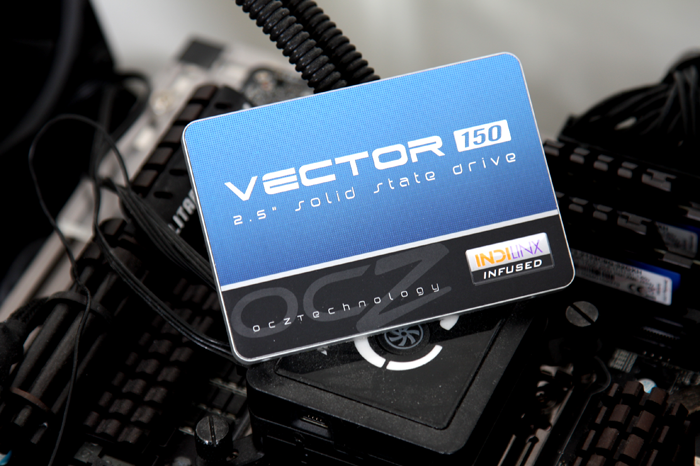Final words and conclusion
Final words and conclusion
Guys, you have a near perfect SSD in your hands with the Vector 150 series SSD. It's endurance is awesome, the performance is really good, the reliability is awesome, then you get 5 years warranty which is awesome and with this purchase you will also receive Acronis True Image HD license (compatible with Windows 8) for free (worth 40 EUR) which is awesome as well. So yeah I'm pretty stoked about this SSD as OCZ did everything right as far as I can tell. The one downside is that you forfeit a little space for over provisioning, but personally I'd be happy to donate 8 or 16 GB of space if that quadruples the lifespan of any SSD really.
Architecture and perf
The Vector series 150 is based upon the Indilinx Barefoot architecture controller, and with it certainly is showing what it can do. The SSD shines at many factors, IOPS performance is outstanding. This SSD is writing and reading ridiculous amounts of tiny files in a very fast fashion. We stated it before though, IOPS is not something you as a consumer should worry about too much unless you are doing a lot of database related stuff on your PC, but this SSD certainly hauls the proverbial ass on IOPS perf. One test that we think is by far the best test in our benchmark suite is PCMark Vantage 64-bit. This is a trace test and can emulate what you guys do on your PC but then multiplied with factor 100. The results with the Vector are very good. The overall peak read performance is excellent to grand, the write performance opposed to say LSI SandForce 2281, LAMD and Marvel controllers is simply exceptional. So much like its older brother, the Vector 150 series are going to shine is its overall IO and razor sharp write performance. Zoom in at both IOPS and Trace performance then you'll notice that the SSD can manage near silly workloads without breaking a sweat. So that's testimony towards the new Barefoot 3 controller. With a few more tweaks this can be the fastest SSD we have ever had our hands on.
Software
Alongside the SSD comes the OCZ Toolbox, which is a handy utility alright. We used the latest revision for on our OCZ Vector sample SSD. The tool will check for available firmware updates and 9 out of 10 times it can flash your drive non volatile and thus keep your data intact. Very handy. The software will also allow you to erase your drive and check out some functions. You'll also receive a license for Acronis True Image HD. With this software you can clone and backup your data and easily restore HDD/SSD drive images within minute's time. This is actually the software suite we use in our office for all local backups. It's great value to see that included.
Overall SSD usage
An SSD is enjoyable, very much so. If you put a drive like this into your SATA 3 compatible laptop or SATA 3 compatible PC, you'll have no idea what is about to hit you. We very much enjoy the grand sustained performance of this SSD series, if you copy a vast amount of compressed data, then the OCZ Vector will perform seriously fast in performance. Make no mistake, replacing a HDD with an SSD in your desktop PC or laptop eliminates the random access lag of the HDD head, it is no longer mechanical. That combined with the performance SATA3 offers these days is simply a massive difference and probably the best upgrade you can make for your computer anno 2012.
SATA Controllers
Some overall recommendations then. Should you be in the market for a SATA 3 SSD then we have a couple of hints though. First and foremost if you have a SATA2 controller only on your motherboard, then you'll get limited at roughly 270 MB/sec read and writes. SATA3 (6Gbps) will free you up from that allowing the SSD to perform in the 500 MB/sec range. It is however important that you connect your SSD towards the proper controller. We absolutely prefer the performance of the Intel Series 6 and 7 (H67/P67/Z68/Z77/H77/Z87/X79) integrated SATA 6G controller over anything else available in the market. If you run the SSD from a 3rd party controller with say a Marvell 6G controller, you will see lower performance. The new AMD 85X chipsets also offer fantastic performance. The more recent Asmedia controllers we spotted lately on motherboards are also offering good performance, albeit still 20%~25% slower then Intel's controllers. Also make sure you run your drive in AHCI mode, it does make such a difference in performance -- really guys, a big difference.
Prices HDD versus SSD
First a generic rule that I always apply, you probably should stop looking at the Solid State Disk technology as if it were a traditional HDD. We all will be old and grey before the two reach the same prices or top the multiple TB volume storage the HDD offers for less money. Comparing an SSD with an HDD is making a comparison in-between an integrated IGP or a dedicated graphics card, that last one will cost you a heck of a lot more yet you gain incredible overall performance. It is the very same with an SSD, use it as boot drive on Windows and applications and you instantly have removed a huge bottleneck, namely load and access times. It is a difference in-between night and day (in a proper system). For massive storage like movies, MP3 files and bulky data you do not access on a regular basis, sure that's where the HDD remains the winner as a cheaper storage solution. Guru3D's rule of thumb; the magic simply is finding a good combination in-between the two and balance things out. Use a nice 240GB SSD for your operating system and applications, and park these movies and MP3 files onto a separate TB HDD. That's where the magic happens. I kid you not, all my test systems and work systems run on SSDs, not once have I considered going back to HDDs. The benefits of a good SSD are simply grand. But that doesn't mean I do not understand the budget and cost dilemma that many of you are facing though.
Concluding
I wanted to create a line or two in the conclusion regarding Warranty. This SSD will receive 5 years of warranty and that's just classy. As stated realistically you can write 10GB per day (365 days a year) for 25 years before you run out of juice. With the new Vector series 150 SSDs OCZ again targets the higher segment of the enthusiast market. This time with the power combo of endurance and lifespan. And that mix we feel is golden. There's very little wrong with this SSD drive as the overall read performance is perfect the trace and IOPS tests are exceptional and the sustained reads are very nice. If IOPS matter to you for say database utilization then again this is a segment where the Vector 150 SSD is very strong. Where the Vector seems to go off charts is the overall write performance, as that's just very good. Pricing then, the most trivial factor, especially if the new technology doesn't offer any significant improvement.
- Vector 120 GB, 135 EURO
- Vector 240 GB, 250 EURO
- Vector 480 GB, 525 EURO
US Dollar prices should be roughly similar, so that's give or take 1 USD per GB. Mind you that these are street prices, not MSRP. So admittedly it's a little on the high side. Then again this is an enthusiast class SSD at launch time. Again you get 5 years warranty. You'll also receive an Acronis disk cloning software and backup utility license which is fantastic software. I have been personally using this software for the Guru3D backups here in the office. The OCZ Vector 150 series offers little left to be desired really. The reality remains though that it is positioning itself in a very saturated segment of the market (enthusiast grade SSDs), and that is the not making the choice any less difficult. But with endurance and lifespan increased by 5 times ... and the warranty the choice shouldn't be that hard. We can HIGHLY recommend the OCZ Vector 150 as it is going to be a successful, reliable, long-lasting and very fast SSD series.
- Sign up to receive a notice when we publish a new article
- Or go back to Guru3D's front page



